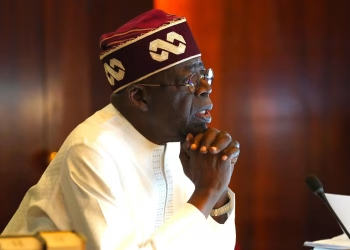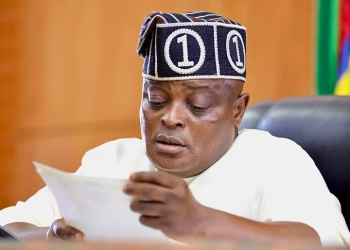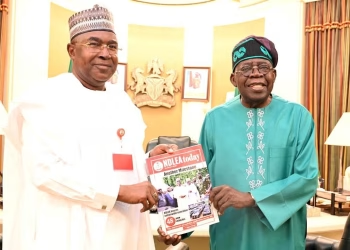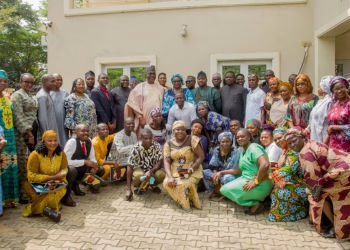By Akaninyene Esiere
In the midst of confusion that seems to pervade Nigeria, a silver lining may just be on the horizon. First, the two major reasons for the confusion: the unconstitutional suspension of elected officials in Rivers State following President Bola Ahmed Tinubu’s declaration of a state of emergency there; and the tango (or the lack of it) between the Senate President Godswill Akpabio and Senator Natasha Agboti-Uduaghan.
A lot has been said about these two issues by many Nigerians so they need not detain us here for long, even though one of my avid readers told me pointedly that he’s waiting to read my views on the Akpabio-Natasha imbroglio! The answer to that is in the belly of the antecedents of these two characters! The Natasha story is still unfolding. Even today it took a life of its own when the beautiful lady caused a decoy landing on a chopper to a tumultuous welcome in her senatorial district despite all attempts by the state to stop her from entering the state. Minions of the state are busy defending nothing. With respect to the happenings in Rivers State, it is a vindication of the strong views REFLECTIONS! has been canvassing through this column that Nigeria is not a democracy. You can give it whatever name but certainly not a democracy.
Today, REFLECTIONS! is focused on the seeming silver lining; fixing its gaze at what can help us retrieve the nut from fire before it is completely burnt. When there is so much gloom, you must deliberately search for something to inspire you; a flicker of hope, if you will. A drowning person will desperately look for even a straw to clutch on. And this flicker of light is coming from an unlikely quarter: the lower house of parliament.
The other day, the House of Representatives caused the second reading of the bill to return Nigeria to parliamentary system of government. In a situation where the country is, this is a huge step forward. Last year, 60 members of the House of Representatives sponsored this bill. I commented then that it was a very good bill that would require our support given its potential of being very beneficial to the country compared to the presidential system currently in place. I also posited that the presidential system was a heavy burden on the neck of the nation.
The United States of America, and any rich country for that matter, can afford to practice presidential governance. It is certainly not meant for poor countries such as ours. It is a very expensive system, as can be seen in the humongous amount we spend sustaining it. It drains badly needed resources of poor countries. Those benefiting from it would rather have the system sustained and keep our people and economy poor than do the right thing.
Secondly, the presidential system gives too much power to one person, the President or to the governor in the case of a state. One can trace the bold, unthinkable and, occasionally frightening actions the President of the United States has been taking since he took over power in January to the presidential system of government in operation there.
It has always been said that Nigeria’s presidency is the most powerful in the world. The incumbent President has demonstrated this already. Even as bold as Donald Trump’s actions appear, were the same happenings in Rivers State which led to the suspension of the elected officials to take place in any of the 50 states in the US, the President of the United States of America would not do what our own President Tinubu has done. The unconstitutional suspension of the governor, his deputy and the state legislature is a test case of how powerful our presidency is. Make no mistake, there’s a Tinubu in every Nigerian. Once you get to that office, the idea that you can literally swallow human beings alive begins to crawl in your mind; after all, what can mere mortals do to you!
The same goes to the way we conduct presidential and governorship elections. Were Nigeria to go to war against another country, it would still be less in intensity, pressure, preparedness, human, military and financial resources deployed than what we deploy to conducting presidential and gubernatorial elections. Because we are a nation that has little regard for statistics, no one can say how much money we spent in the last presidential election, let alone the governorships.
These things ought not so to be. Which explains my reason for desiring to see the patriotic move of the House of Representatives in seeing the bill in question become law. At the very minimum, it would free up resources for the development of the country as well as kill the Ministry of Ego which our government officials have built simply because they are public officials.
As an opposition leader, President Tinubu had consistently canvassed the convening of a national (sovereign or not) conference to address the myriad issues afflicting Nigeria and impeding our progress. He was strident that if his party, the All Progressives Congress, took control of the reins of government, a restructuring of the country would be undertaken. Combined, APC has been in power for nearly a decade, and there is not as much as a whimper of political development of the country. If we make excuses for the eight years misrule of the Mohammadu Buhari government, President Tinubu has been on the driver’s seat for almost two years now and there is not a policy framework to fix Nigeria politically. Rather, he is busy entrenching the very decadent structures he once criticized. Meantime, the perceived or real imbalance in the system, the injustices visited upon Nigerians, the lack of a level playing field for every citizen, the areas that appear to be taboos and the like continue to fester while the nation bleeds shamelessly. With the levers of power to do and undo, the government can care less about a structurally defective system. One can say with some degree of certainty that political restructuring will be a major item in his second term.
It will be a grave mistake. President Goodluck Johnathan’s undoing in the national conference he convocated was the timing. He first scoffed at the idea when he won the 2011 elections. Immediately he knew power was gradually slipping away from him, he quickly threw the national conference’s bait; and it was too late. His government could not even implement any of the conference’s recommendations; and President Buhari, his successor, didn’t waste time shredding the document literally. Tinubu wants to repeat the same mistake by postponing the evil day.
Which explains why the move by the House of Representatives to return the country to parliamentary rule should be supported by all well meaning Nigerians. The House should be encouraged to follow through with its goal; and the Senate should be on cue to pass the bill without any delay; while the President should sign it into law immediately the National Assembly sends the bill to him. Signing the bill into law relieves the President of the burden of tinkering with the political structure of the country, which he is unwilling to do at this point.
To allay the fears of the President that the bill is a coup by other means, the take off date of the new system of government should be May 29, 2027; and, within his party, he will have the right to choose whether he wants to be the ceremonial President or the Prime Minister. If he wants the latter, his party can make him the head of the party.
My guesstimate is that the country will reduce the cost of governance by half under parliamentary rule; same with the cost of elections. If you view the happenings in Rivers State as part of the game toward the 2027 election, it drives home the point being made that presidential system of government is not only costly but also a drawback for our development.
Nigeria is no stranger to parliamentary governance. At independence in 1960, it was the system that was created by the colonial masters. It was only thrown out by the 1966 military coup. Unfortunately, the constituent assembly of 1978 recommended presidential system for the second republic which commenced in 1979; and was sustained when General Abdulsalami Abubakar handed over power in 1999. Having practiced the two popular systems, it is clear that the benefits of the parliamentary system are far greater than those of the presidential.
A system of government that does not genuinely address the developmental needs of the people should not be massaged by anyone any longer. A stitch in time can save a nation.
THE UROMI 16
The gruesome murder of 16 passengers in Uromi, Edo State is bestiality at its worst. Forget about who they were: hunters or not; armed or not. They were human, first and foremost. All you needed do was to arrest them and hand them over to the police; if you suspected anything. The killings are, truth be told, a reflection of how far we have fallen as a nation. More importantly, it is a reflection of the abdication of the cardinal responsibility of the state which exists primarily for the welfare and security of the citizens. Let’s call a spade by its name.
Esiere is a former journalist!
©️2025











